Celoxis Review
Celoxis is a diverse project portfolio management tool that supports users with everything from task management to project budgeting. Despite being over two decades old, the platform has struggled to reach the mainstream. With the aim of understanding why that is, we’ve tested the software and compiled this detailed Celoxis review.
Key Takeaways: Celoxis Project Management
- Celoxis will appeal to those in software development because of its Agile tools and terminology.
- Overall, while the software is good, it lacks some navigational fluidity we would expect to see from a tool that’s been around for over 20 years.
- The asking price will surely put many users off, especially when there are cheaper and better alternatives available.
Founded in 2001, Celoxis is one of the longest-running online project management platforms you’ve likely never heard of. With over two decades of experience, why has this company only amassed 2,800 customers? Is it soft marketing or a bad product? To find out, we tested the software for this Celoxis review.
To give you context, the best project management tool, monday.com, which you can learn about in our monday.com review, has 186,000 active paying customers — and it was founded 11 years after Celoxis. Interestingly enough, Celoxis has all the project management tools we would want to see from a product, and it also has several resource management tools to help you keep on top of workload.
So how could it be that this veteran of the game has remained in the shadows of its more youthful competitors? In this review, we’ll break down all of its core features, its cost and its usability, ensuring there’s no more confusion surrounding how good Celoxis actually is. Let’s take a look.
-
08/26/2024 Facts checked
We have updated our Celoxis review with information about security features, resource management tools and automations.
Celoxis Alternatives
- 1$10 / month(All Plans)
- 2
- 3
- 4$15 / month(All Plans)
- 5
Celoxis Review: Pros & Cons
Pros:
- Software development tools
- Resource management tools
- Time log features
- 30-day free trial
Cons:
- Not the easiest to navigate
- Expensive
- No free version
Features
Most project management software suites tend to stagger their features across multiple plans that increase in cost. Celoxis doesn’t do this, instead offering a one-size-fits-all plan for its cloud-based platform.
Avoid Costly Project Management Mistakes – Get Free Tips Today!
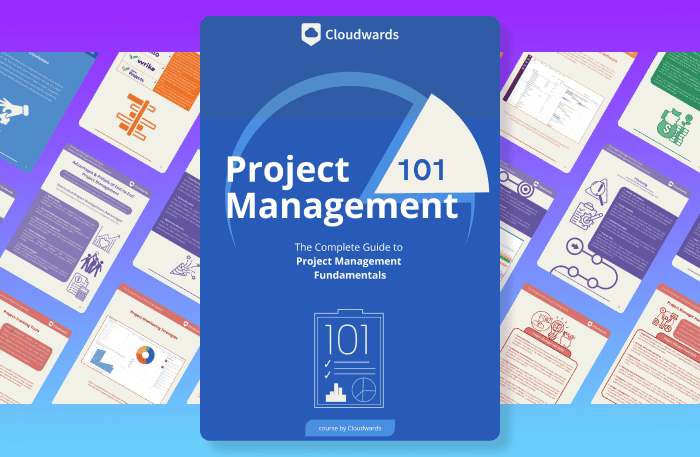
- Discover 10 fundamentals of project management
- Understand step-by-step plans for PM execution
- Learn tips to avoid 5 common mistakes by beginners
Because Celoxis doesn’t limit features on a plan basis, rather than break down plans — which is what we normally do in our reviews — we will break down the different types of features you can get when using the platform.
Task Management
The best project management software options come with multiple ways for users to improve task management and manage projects. Celoxis has done the opposite, opting to provide only two task management views. The good news is that they’re two of the most popular, in the form of a kanban board and Gantt chart.
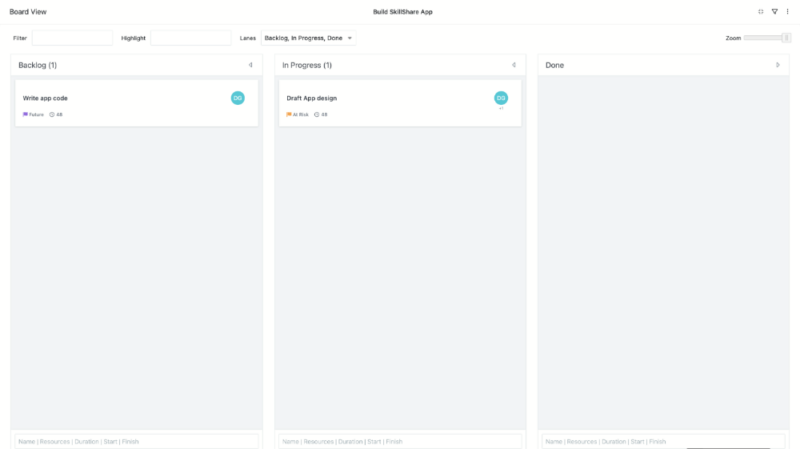
The project manager can assign tasks to other users, set task priorities and create task dependencies, which become more useful when working inside the Gantt chart view. There’s also a calendar, but, for reasons unbeknownst to us, tasks don’t automatically transfer to your calendar, which is frustrating.
Niche project management software that zones in on development tends to be deficient in terms of task management views. However, if you want more functionality on top of your Agile tools, check out the top three software options on our selection of the best Agile tools.
Resource Management
Celoxis also has resource management features to help project managers effectively allocate work to other team members. Through a designated “workload” tab, the project manager is able to access an overview of team member workload distribution across multiple departments.
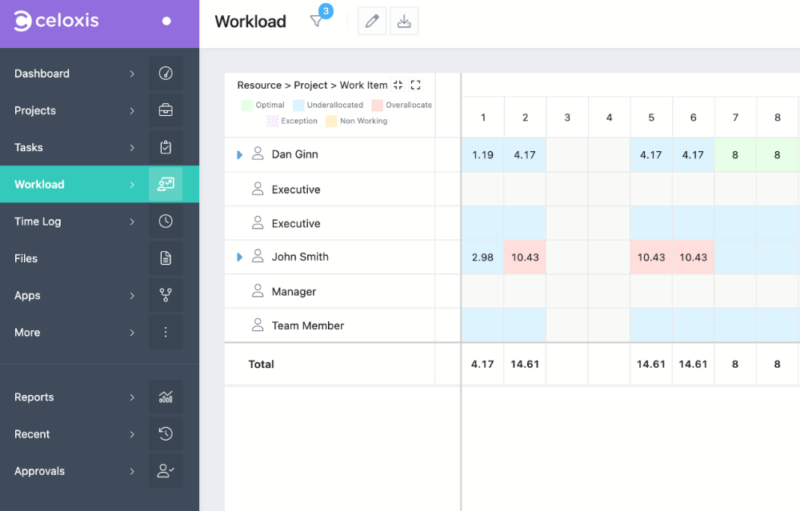
Workload is measured in hours, and Celoxis uses a color coding system to help project managers effectively allocate resources. Red suggests a team member is over allocated, blue is under-allocated and green shows optimal allocation of workload. Project managers can also view “planned” and “actual” workload to monitor how effectively tasks are being distributed.
To dig a little deeper, the “workload” tab allows you to see tasks assigned to a team member via a dropdown menu. Here, project managers can see if someone has two tasks to complete, for example. If they do, they can reallocate tasks to someone who has room for more allocation. These simple resource management tools are a great way of managing projects.
Additionally, Celoxis offers a more advanced what-if analysis tool that can help project managers predict resource allocation needs and project outcomes.
Time Management
Celoxis likely won’t make it to our selection of the best time management tools, but it does have some useful features in this department. There’s a built-in time tracker, but accessing it isn’t as straightforward as it should be. If you want a simple — and free — automatic time tracker, check out our Clockify review; it’s one of the best.
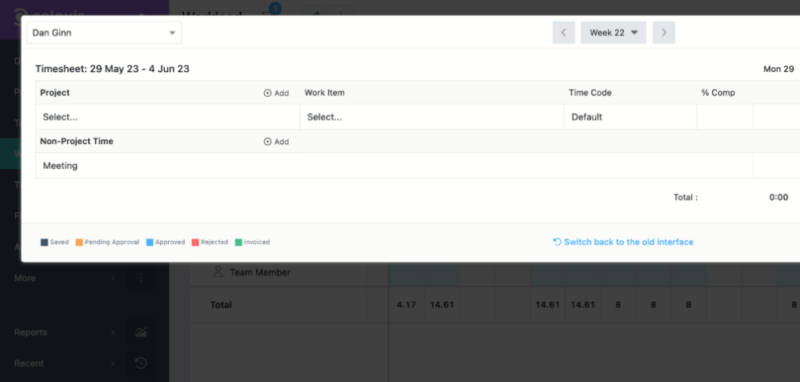
If you’re unable to use the time tracker, you can upload the data manually in the form of weekly time sheets. Celoxis also provides an automatic scheduling tool that can adjust timelines and task dependencies based on team member availability. Project managers can also create an approval process to ensure work hours are signed off on before the team member is paid.
Budget Management
Aside from project management and resource management, there are also some useful tools to help with budgeting. When a project manager creates a new task, they’re able to add planned cost, actual cost and the agreed budget through a cost baseline. This helps everyone involved see an overview of how much the overall project is costing and how on target they are with project budgets.
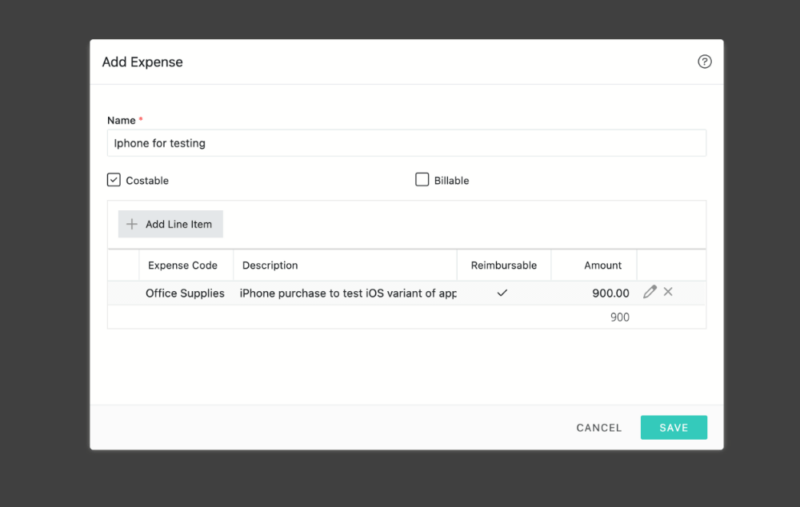
There’s also a section to log expenses. Here, team members can log the project the expense pertains to, add a code and leave a description of the expense. Following logging the expense, it can be sent to the relevant reporting manager for approval.
Integrations and Automations
It’s possible to integrate Celoxis with hundreds of third-party apps. For example, you can integrate with one of the best cloud storage services, Google Drive, and attach files directly from your Drive account inside the Celoxis web application.
Other popular integrations include Slack (read our Slack review), allowing you to convert starred chats into tasks, and Zendesk, which enables you to automatically turn ticket requests into tasks.
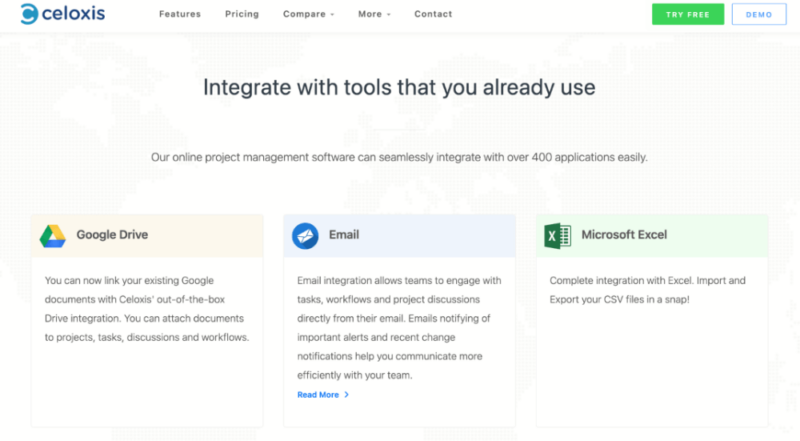
Celoxis also supports custom apps, which allow project managers to create custom workflows for specific tasks, such as bug and issue tracking, employee leave requests and more.
Client Portal
Celoxis has created a free client portal that allows users to invite external clients to a project. Through the client portal, your client can see a full overview of the project timeline, see task details (excluding financial information), add comments and determine the overall health of the project status.
Those accessing via the portal are unable to make any changes to the project. However, having their insight helps build a culture of team collaboration and helps you and your team keep on track, while being able to quickly make any changes your client feels are necessary.
| Features | |
|---|---|
| Kanban board | |
| List | |
| Calendar | |
| Timeline | |
| Spreadsheet view | |
| Gantt charts | |
| Workload planning | |
| Long-term planning | |
| Multiple project management | |
| Dependency management | |
| Native scrum management | |
| Set user permissions | |
| File storage | |
| Time-tracking | |
| Built-in integrations | |
| Reporting features | |
| Free plan | |
| Free Trial | |
| Web app | |
| Windows | |
| MacOS | |
| Android | |
| iOS | |
| AI Tools | |
| Ticket-based support | |
| Tutorials | |
| Knowledgebase | |
| Forum | |
| Live chat | |
| Phone support |
Pricing
Compared to most other project management software choices, Celoxis isn’t cheap. There are three plans on offer for its cloud-based software, though you can also pay for an on-premise version, where cost can be negotiated with the sales team.
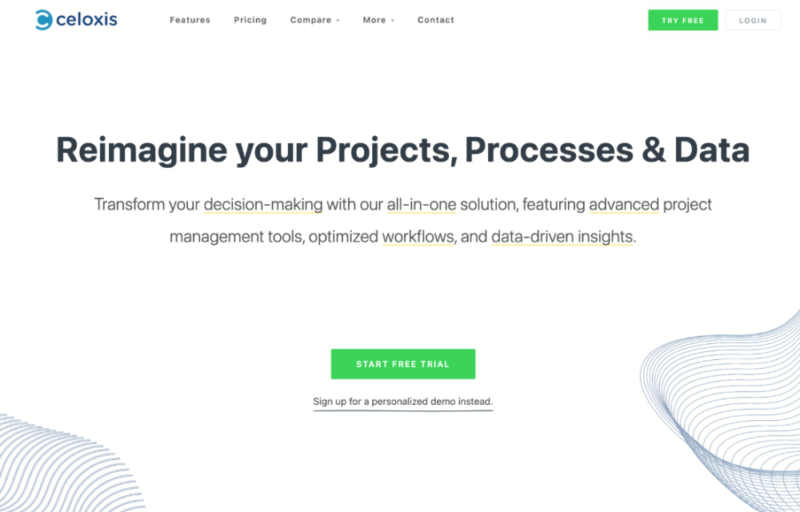
Its Essential plan costs $25 per user per month. The next tier which is called the Professional plan costs $35 per user per month, and its Business plan costs $45 per user per month. All plans are billed annually.
User-Friendliness
We have reviewed dozens of project management tools here at Cloudwards, and in terms of user-friendliness, Celoxis is far from the best. While immediate impressions were positive, once we really began to use the tools, we were left feeling frustrated more often than not.
Navigational Concerns
Most of the features are accessible via the left-hand menu. Things start off well; select a tab and you’re taken to the expected page. However, some of the tabs further down are totally unresponsive when you select them.
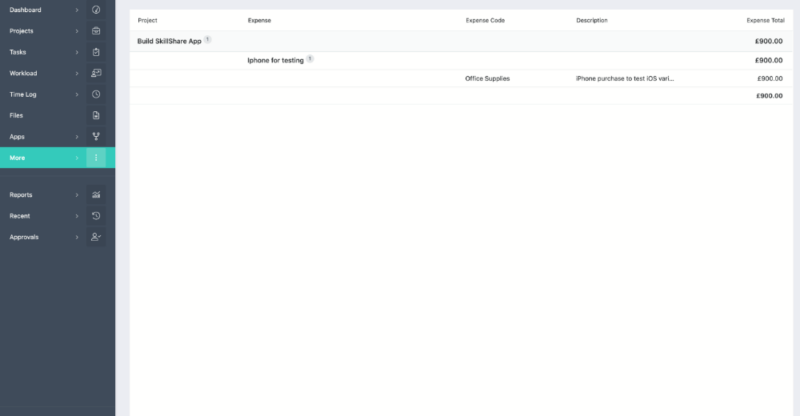
Instead, you have to hover over them, which then generates a submenu, but we had to wait five seconds before the submenu appeared. This may not seem like much, but compared to most project management platforms, this is snail-pace navigation.
Other functions also require what we believe are too many steps. Take expenses, for example. When you click the dedicated tab, you’re taken to a run down of expenses, but there is no functionality to add a new expense.
Users have to select the “+” tab in the top menu to add a new expense. This may seem like nitpicking, but Celoxis could certainly improve the labeling and navigation of the software for a smoother overall user experience.
Adding New Data
Adding any data to your project is done via the “+” tab. Creating tasks, reporting bugs and other project data is simple enough and doesn’t require any guidance. In regards to tasks, there’s a top menu inside each new task that lets you add relevant information such as budgets and task dependencies. You can also preselect which column the task needs to be in if you’re using the kanban board.
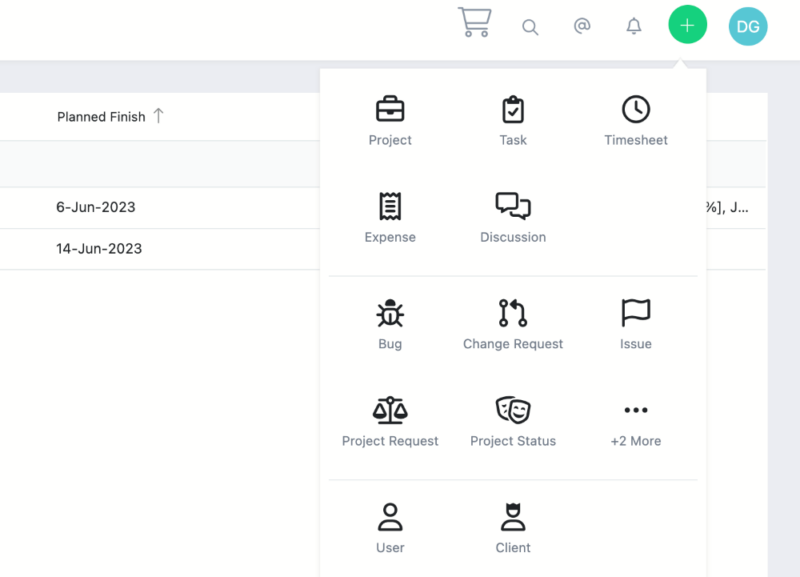
As for project views, the kanban is standard, but not fantastic. You have three columns that follow traditional scrum methodology, starting with a backlog. Users are unable to add extra custom columns, so for that type of versatility, we recommend reading our Trello review.
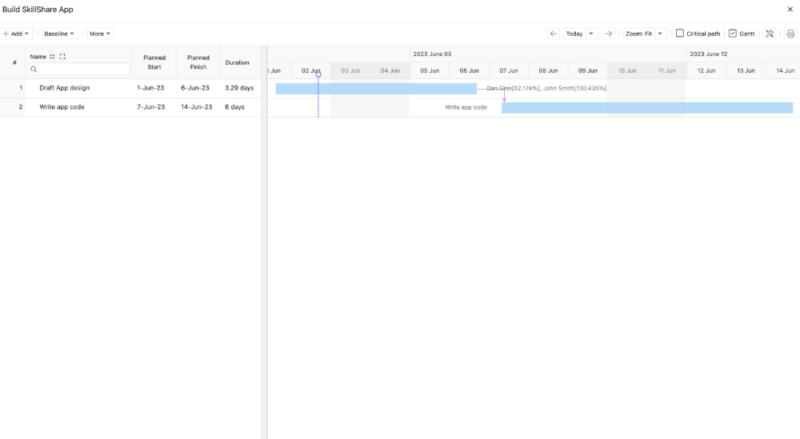
We found the Gantt chart to be very responsive and data easy to digest, with some customizable views to zone in on the data that is most important to you. It doesn’t quite match the speed, power and versatility of TeamGantt, our favorite Gantt chart service on the market, but it is, overall, a very usable tool.
User Guides
To help you get to grips with the software, you have access to 12 tutorial videos. We found them to be very helpful and appreciated their long-form makeup, as opposed to quick overviews of how to use the software.
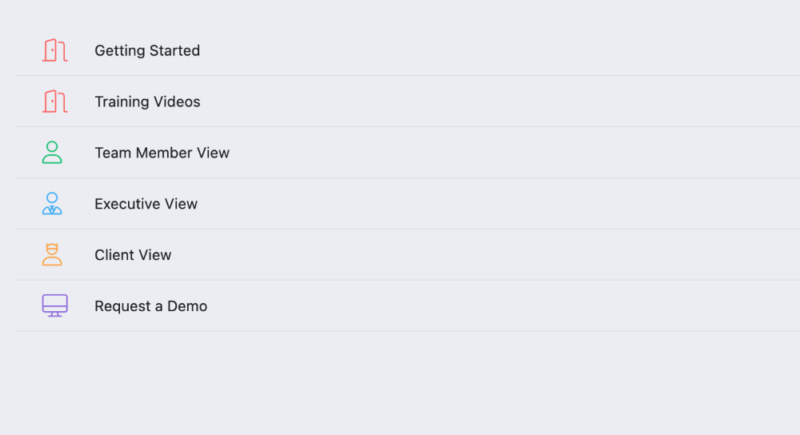
On the topic of user-friendliness, Celoxis is far from the worst software we have used. The design is more than good enough, and functions all work well once you get going. However, some improvements are needed in the navigation department if it wants to sit at the same table as the big hitters in the project management space.
Security & Privacy
With every project management software review, we take the time to read through the security and privacy policy. Knowing how a company uses your data is important, especially in a world filled with cyber attacks and malicious online behavior.
How well does Celoxis do to combat any potential leaks of your data? Very well, and the company is also transparent about how it protects and manages your data (though the privacy policy isn’t the easiest read).
Industry standard security is in place, as the company uses AES 256-bit key encryption both in transit and at rest to prevent anyone from accessing your data. Celoxis uses an intruder detection system which is constantly monitored to anticipate hacks and brute-force attacks. Physical access to data centers is limited to the company co-founders; regular employees don’t have access.
At the software level, Celoxis offers multi-factor authentication, which adds an extra layer of security to user accounts. Managers and admins can also set user access types and add custom permissions to ensure that only those who need access to certain data have access.
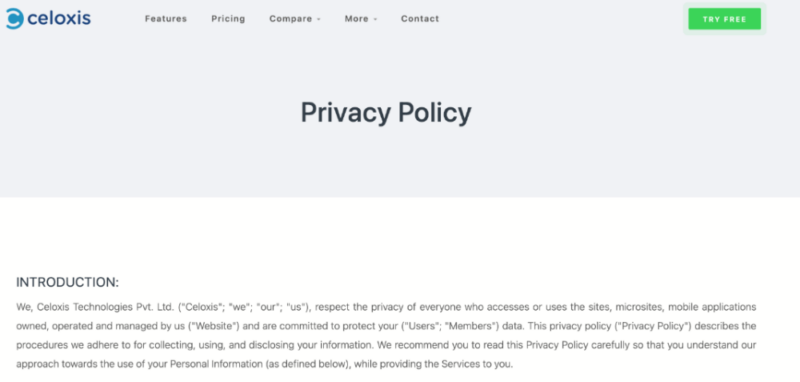
On the privacy policy front, Celoxis only collects data such as name, email address, business address and name of organization. Unlike some project management services, the company does not view your previous website history, nor does it share your data with other companies with the intention of sending targeted ads.
Customer Support
You can get up to speed with Celoxis through several avenues and receive free support from a member of the technical team. We tried and tested all of Celoxis support options, and for the most part, we were impressed. However, there was one red flag that we need to point out.
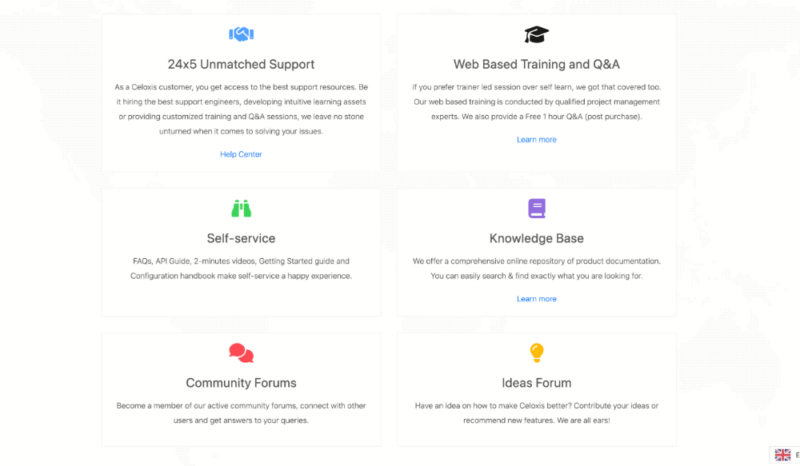
We contacted the support team through the integrated live chat in the web app. We had a query regarding functionality, a query we felt could be resolved easily with some guidance. The member of the support immediately asked for our login details — email and password.
This was far too quick for our liking, and totally unnecessary. Only under extreme circumstances would we allow remote access to someone who, essentially, is a stranger on the internet. After declining, the support member (who was otherwise very helpful) resolved the issue with some guidance, proving there was no need to request our credentials so quickly.
On top of the support team (which is available 24/5 Monday-Friday), you have an extensive knowledgebase, a community forum and plenty of tutorials, all of which we found useful.
The Verdict
Celoxis is very matter-of-fact, in that it does what it says on the tin, but it lacks some of the flair we see with modern day project management software. Its dry, charisma-free design hardly inspires us to “get work done.”
That said, this isn’t project management software for a creative agency. It’s a solution for those that don’t need a fancy exterior, instead opting for an efficient engine that gets them from A to B in their project. In that sense, despite some minor navigational concerns, Celoxis is a good enough tool for most, though we doubt it will ever reach the customer base of its more attractive, mainstream competitors.
Did you enjoy our Celoxis review? Do you see enough substance for you to invest in the product? What other software for project management would you like us to review? Let us know in the comments. Thanks for reading.
FAQ: Celoxis Review
Celoxis is a project management tool that can help support the management of multiple projects. Users can also use it as a resource and financial management tool.
Yes. Celoxis offers a free 30-day trial of its platform.


